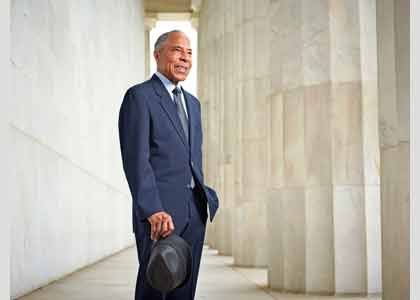He was known as the giant who never quit. George Haley, a Silver Spring, Maryland resident and brother of famed author Alex Haley, died earlier this month. He was 89.
“He had quite a full life,” his son, Kansas Democratic Senator David Haley said. “Going through some of his papers and going over some of the accolades, it’s a remarkable story that George Haley put into just shy of 90 years.”
George Haley counted as one of Martin Luther King Jr.’s closest friends as the two attended Morehouse College in Atlanta together.
Haley was first elected to the Senate in 1964 as a Republican representing Kansas City, Kansas. He stood with King at an appearance at Kansas State University in January 1968, just three months before the civil rights icon was assassinated.
Haley returned to Kansas State University in 2011 to hear a rediscovered recording of King’s remarks from that January appearance, the Kansas City Star reported. His name was among those found written on a paper in King’s clothes after King was killed by a gunman in Memphis, Tennessee, on April 4, 1968.
After graduating Morehouse in 1949, Haley went on to earn a law degree from the University of Arkansas in 1952. He was one of just two African Americans at that school, enduring racism and other biases.
Haley later joined the law firm of Stevens Jackson in Kansas City, which provided assistance on the desegregation case, Brown v. Board of Education.
After an unsuccessful bid for Congress in 1966, he joined a Washington, D.C. firm and eventually formed his own practice.
In 1976, Haley’s brother, Alex Haley, published “Roots: The Saga of an American Family,” a book based on their family’s history. It focused on the story of Kunta Kinte, a Haley ancestor kidnapped by white slave traders from his homeland in Gambia in 1767.
The book later was adopted for screen and, in 1977, premiered as a weeklong special on ABC, becoming one of the most watched mini-series in television history.
Alex Haley said the journey to write the book began in Annapolis, Maryland, where his ancestors had arrived from Africa in shackles.
“Before Alex Haley became a household name, his younger brother George was already making history. Already a veteran of the Army Air Forces, in ‘George Haley: The Man Who Wouldn’t Quit,’ Alex chronicled the story of how his brother made history,” Curtis Valentine, an at-large Prince George’s County school board member wrote in a blog.
“Alex outlined just how difficult young George had it. [He wrote] the first day of school, he went quickly to his basement room, put his sandwich on the table, and started upstairs for class,” Valentine recalled.
“He found himself moving through wave upon wave of white faces that all mirrored the same emotions, shock, disbelief, and then choking, inarticulate rage. The lecture room was buzzing with conversation, but as he stepped through the door there was silence. He looked for his seat. It was on the side between the other students and the instructor.
“When the lecture began, he tried desperately to concentrate on what the professor was saying, but the hate in that room seeped into his conscience and obliterated thought.”
George Haley would go on to overcome living in the law school basement, having a bag of urine thrown at him, death threats, and even being ostracized by other African-Americans to graduate at the top of his class and become member of the prestigious Law Review, Valentine noted.
Haley served under six presidents, including as chairman of the Postal Rate Commission under President George H.W. Bush and as U.S. ambassador to Gambia from 1998 to 2001 under President Bill Clinton.
Haley, who once met George Washington Carver and singer Marian Anderson is survived by his wife, Doris Haley; his son, David Haley; and his daughter, Anne Haley-Brown.
